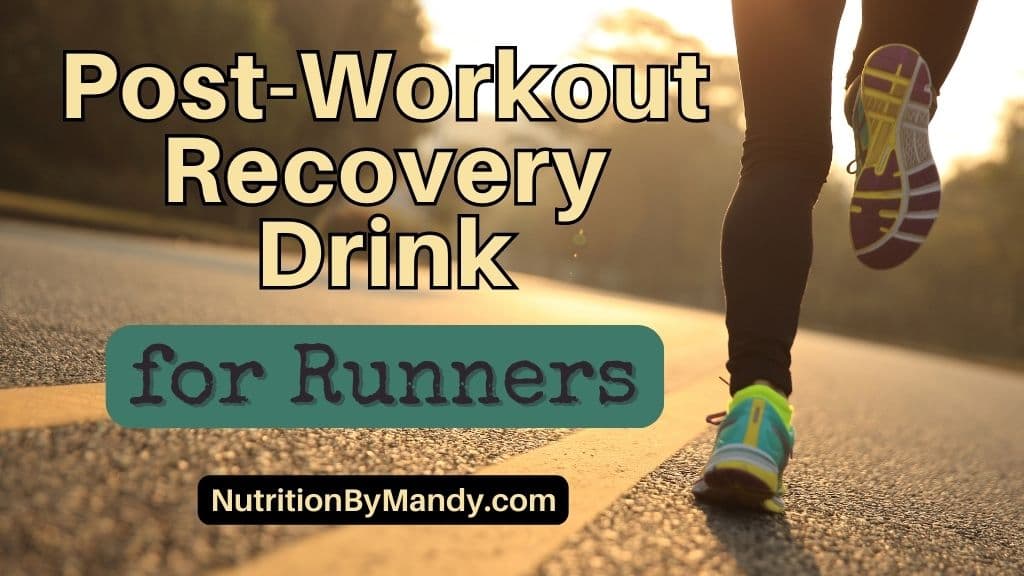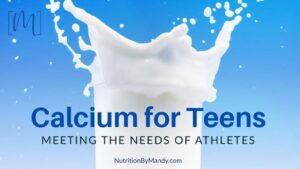Last Updated on February 3, 2026 by Mandy Tyler, M.Ed., RD, CSSD, LD
Post-Workout Recovery Drink for Runners
Following a run, a well-planned recovery drink can help runners with meeting their sports nutrition needs.
Let’s take a look at the key nutrients that runners should include in a recovery drink. Then we will explore a variety of recovery drinks that runners can enjoy.
What Should Be Included in a Recovery Drink for Runners?
Following a run, athletes should focus on consuming nutrients that will support their bodies with rehydrating, refueling, and recovering from the workout.
When athletes run, they deplete their energy (carbohydrate) stores, breakdown muscles, and sweat. Therefore, the three key areas runners should focus on following a run include:
- Hydrating – Replace fluid and electrolytes lost in sweat during the run.
- Carbohydrates – Refill energy stores used during the run.
- Protein – Consume protein to help build and repair lean muscle mass.

Recovery Drink After a Run: Rehydrating
During exercise, the body sweats to help dissipate heat. To replace fluid losses, runners need to drink more fluid (125%-150% more) than the amount lost in sweat (1).
Runners can determine the amount of fluid to consume by weighing themselves before and after the run. For each pound of weight lost during the activity, athletes should aim to drink 20-24 oz of fluid to fully rehydrate before their next run (1).
Replacing Electrolytes Following a Run
In addition to fluid, runners should also focus on replacing the electrolytes lost in sweat. The main electrolyte lost in sweat is sodium. Thus, consuming food and drinks that contain sodium and other electrolytes following a run can be beneficial.
Sports drinks, vegetable juice, tomato juice, and broth-based soups all contain sodium and can help with replacing sodium and fluid losses following a run.
In addition, fruits, vegetables, milk, and yogurt are all natural sources of electrolytes and advantageous to consume following a run.
*Note: Talk with your doctor or a sports dietitian nutritionist about staying hydrated if you are required to limit your fluid or sodium intake.

Recovery Drink After a Run: Carbohydrates
When runners need to refuel quickly to prepare for the next workout session or run, it is important to focus on replenishing their carbohydrate stores.
To optimize recovery, it is recommended that runners aim to consume 1-1.2 grams of carbohydrate per kilogram body weight for the first 4 hours after activity (1). For a 165-pound athlete, this would be 75 – 90 grams of carbohydrates.
Recovery Drinks with Carbohydrates
Runners will want to ensure their recovery drink contains carbohydrates to help refill their energy stores.
Drinks such as chocolate milk, 100% fruit juice, fruit smoothies, and sports drinks all contain carbohydrates and can contribute to a runner’s recovery nutrition needs.
If the recovery drink selected is low in carbohydrates, the runner should consider enjoying a carbohydrate-rich snack with the drink to support their training needs.
Recovery Drink After a Run: Protein
When individuals run, they breakdown their muscles. Thus, including protein in a recovery drink following a run will support the repair and building-up of lean muscle mass.
Following activity, it is recommended that athletes consume ~0.3 grams of protein per kilogram body weight (1).
In general, this calculates to be in the range of 20-40 grams of protein, with larger athletes needing more protein than smaller athletes (2).
Do I Need a Recovery Drink After Every Run?
Focusing on recovery nutrition is particularly important for runners when time between workouts is limited. This includes runners who are doing multiple workouts in a single day or back-to-back days of intense running sessions.
If you are going out for a low-intensity or short-duration run, a recovery drink may not be necessary. Rehydrating and following your sports nutrition meal plan including healthy meals and snacks may be sufficient.
Also, if you plan to eat a meal immediately after a run, a recovery drink may not be necessary. For example, if you plan to eat a nutritious breakfast after your run that meets your recovery nutrition needs, there is generally not a need to drink a protein shake as well.
Also, runners who are working on weight loss goals should consider how the recovery drink fits into their overall weight loss plan.
Recovery Drink Ideas for Runners
Now that you understand what should be included in a recovery drink for runners. Let’s explore several recovery drink ideas athletes can enjoy following a run.
Chocolate Milk
Chocolate milk can be an easy post-run drink option to help runners meet their recovery nutrition needs. A 1-cup serving of chocolate milk provides 8 grams of complete protein and 26 grams of carbohydrates (3).
Chocolate milk is 90% water, which can help athletes rehydrate following activity. In addition, chocolate milk contains calcium and Vitamin D for strong bones, along with B Vitamins, Vitamin A, potassium, and phosphorus making it a nutrient-rich choice for runners.

High-Protein Milk
If looking to further boost the protein content of your recovery drink following a run, consider purchasing an ultra-filtered, high-protein milk. Ultra-filtered milks, are filtered to remove the lactose and have a concentrated protein content.
For example, a cup of Fairlife® ultra-filtered, chocolate milk has 13 grams of protein, 50% more than regular milk. For runners who are lactose-intolerant, ultra-filtered milk is lactose-free and an option they can enjoy following a run.
Fruit Smoothie – Nutritious Recovery Drink for Runners
A fruit smoothie can be another nutritious option to help runners meet their recovery nutrition needs.
Some runners do not have an appetite after exercise. For these individuals, a post-workout smoothie can be a cool and refreshing recovery drink option following a run.
When preparing your smoothie, make sure to include a variety of frozen fruits, which will provide carbohydrates, vitamins, minerals, and electrolytes. Some of my favorite fruit choices for runners include: blueberries, blackberries, raspberries, cherries, and bananas.
Also consider throwing in a handful of leafy greens, such as spinach or kale, for their anti-inflammatory benefits.
Ideas for Adding Protein to a Post-Run Smoothie
There are numerous ways runners can increase the protein content of their smoothie, including:
- Greek yogurt
- High-protein milk
- Dry milk
- Cottage cheese
- Tofu
- Nut butter
Pro Tip: Check out my post-workout smoothie blog to download a free cherry berry recovery smoothie for athletes.

Protein Powder – Convenient Recovery Drink Option for Runners
When time is limited, using protein powders to make a shake can be a convenient option to assist runners with meeting their recovery nutrition needs.
Third-Party Testing of Protein Powders
Keep in mind when purchasing a protein powder, that sport supplements are not regulated by the Food and Drug Administration in the same way that food is.
Dietary supplements may contain banned substances that could potentially be dangerous to your health and/or make you ineligible for competition (4).
Due to this, look for supplements that have been third-party tested. Supplements that are third-party tested have an outside organization evaluate the supplement for accuracy of ingredients.
Two companies that evaluate sports supplements are NSF International Certified for Sport and Informed Sport.
As a reminder, supplements are intended to “supplement” your diet – not take the place of whole foods and a well-balanced sports nutrition meal plan.
Evaluating Protein Powders
Aside from third-party testing, there are other considerations to make when purchasing a protein powder, including:
- Type of protein
- Amount of protein in one scoop of the powder
- Added ingredients aside from protein
When selecting a protein powder, I suggest looking for one with limited added ingredients aside from the source of protein.
Pro Tip: Runners can easily blend the powder with milk, 100% fruit juice, frozen fruits, leafy greens, and nut butters to increase the carbohydrate, vitamin, and mineral content of the recovery drink.

Ready-to-Drink Protein Shakes Following a Run
There are numerous ready-to-drink protein shakes on the market, which runners may turn to as an option when time is limited.
When selecting a ready-to-drink protein shake, use the same considerations discussed above for evaluating protein powders.
Two of my favorite ready-to-drink protein shakes include:
- Core Power® Protein Shake: Core Power® is made with Fairlife® ultra-filtered milk, which provides a source of high-quality protein. The Core Power® protein shake is available at two protein levels, 26 grams of protein or 42 grams of protein.
- Evolve® Plant-Based Protein Shake: Evolve® is made with pea protein and contains 20 grams of protein per shake. It is a convenient recovery drink option for runners following a plant-based diet.
Pro Tip: Along with the ready-to-drink protein shake, I encourage runners to add a carbohydrate-rich snack to help boost their carbohydrate intake post-run.
Greek Yogurt Drinks Following a Run
Greek yogurt drinks are another convenient option for athletes to enjoy after a run.
The yogurt drinks come in a variety of tasty fruit flavors, such as strawberry banana and peach. I find them to be a good option to keep in the refrigerator for when time is limited after a run.
The Oikos Pro® yogurt drinks are my go-to option, as they have 23 grams of protein per 7 fl oz bottle. In addition, they provide an excellent source of calcium and Vitamin D, which are key nutrients for supporting a runner’s bone health.
Recovery Drink for Runners
You are now set with a variety of ideas for recovery drinks runners can enjoy to meet their sports nutrition needs.
Remember, following a run it is important to rehydrate, refill your carbohydrate stores, and consume protein to build and repair muscle mass.
For additional sports nutrition tips for runners, check-out my blog: What to Eat Before a Morning Run.
Join the Nutrition By Mandy Email List & Get a Free Athlete’s Grocery List
Click HERE to join the Nutrition By Mandy e-mail list. When you join you will receive a free athlete’s grocery list to print and take with you to the store.
About the Author
Mandy Tyler is a Sports Dietitian Nutritionist in the San Antonio, TX area. She is a Registered and Licensed Dietitian, a Board-Certified Specialist in Sports Dietetics, a Licensed Athletic Trainer, and is a Certified Exercise Physiologist through the American College of Sports Medicine. Mandy has experience working with athletes at the high school, collegiate, and professional levels. She believes the key to reaching one’s full potential, both in everyday life and in sports performance, relies on a healthy nutritional foundation.

If you are looking to take your performance to the next level, make sure to check out my new Sports Nutrition Game Day Guide. This downloadable guide is written to help athletes develop an individualized plan to achieve peak performance on game day.





